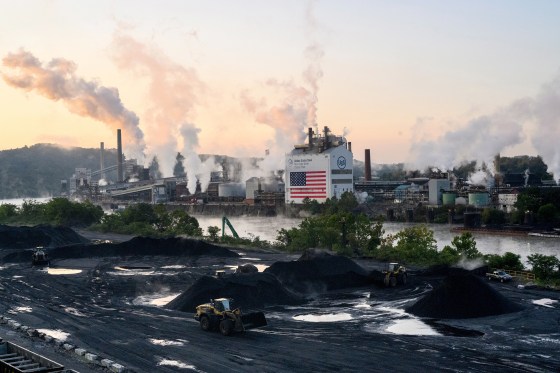TOKYO — President-elect Donald Trump said Monday that he would block a Japanese company’s $15 billion bid to acquire U.S. Steel, a contentious deal that faces widespread political opposition.
Nippon Steel, Japan’s largest steelmaker, announced the deal last December and has said it is determined to see it through despite concerns about the implications for employees, supply chains and U.S. national security.
“I am totally against the once great and powerful U.S. Steel being bought by a foreign company, in this case Nippon Steel of Japan,” Trump said in a late-night post on his Truth Social platform.
“As President, I will block this deal from happening. Buyer Beware!!!”
Trump had expressed opposition to the deal during the presidential election campaign, along with President Joe Biden and Trump’s Democratic rival, Vice President Kamala Harris, who all said the Pittsburgh-based company should remain American-owned. Trump’s comments Monday night are his first on the subject since he won the election last month.
A senior Nippon Steel executive told reporters last month that the company hoped to close the deal before Trump returns to the White House in January.
Nippon Steel said in a statement Tuesday that it was “determined to protect and grow U.S. Steel in a manner that reinforces American industry, domestic supply chain resiliency, and U.S. national security.”
“We will invest no less than $2.7 billion into its unionized facilities, introduce our world-class technological innovation, and secure union jobs so that American steelworkers at U. S. Steel can manufacture the most advanced steel products for American customers,” the company said.
The deal is also opposed by the powerful United Steelworkers union, though some other U.S. Steel employees support it. U.S. Steel says the transaction should be approved on its merits and that its benefits are “overwhelmingly clear.”
“Nippon Steel has committed to preserve U.S. Steel as a U.S. company headquartered in Pennsylvania and to contribute billions of dollars of investment to our mills and communities, securing the future of steelmaking in Pennsylvania and Indiana,” the company said in a statement on Tuesday. “No other party can do this.”
The company has said the collapse of the deal would make the American steel industry less competitive globally and could cost thousands of union jobs at blast furnace facilities that might otherwise have to shut down.
Nippon Steel has argued that the acquisition would benefit both companies and their employees, as well as the U.S. and Japan, a key U.S. ally. A Japanese government official declined on Tuesday to comment on matters concerning the management of individual companies.
“That said, our understanding is that it is essential for both of our nations to further strengthen economic relations, including the expansion of mutual investment in both of our countries, to achieve sustainable and inclusive economic growth in the Indo-Pacific region, and to cooperate with each other in the field of economic security,” Deputy Chief Cabinet Secretary Kazuhiko Aoki told reporters in Tokyo.
Nippon Steel says U.S. Steel would remain American-run, with Americans serving as three of the board’s independent directors, as well as “core senior management members.” It says it would prioritize production at U.S. Steel to meet demand in the American market, the company headquarters would remain in Pittsburgh, and there would be no layoffs or plant closures as a result of the deal.
Experts say that the deal has been politicized and that its failure could inadvertently help China, which produces more than half of the world’s steel, maintain its dominance of the global market. American and international business groups have also expressed concern that the deal is being politicized.
Biden allowed Nippon Steel this year to resubmit its filing with a government panel that reviews foreign investments for national security risks, giving it more time to allay bipartisan concerns. The deadline for the review, by the Committee on Foreign Investment in the United States, is at the end of this month, though it could also be extended.
Trump said he would find a way to preserve U.S. Steel as it is.
“Through a series of Tax Incentives and Tariffs, we will make U.S. Steel Strong and Great Again, and it will happen FAST!” he said.
Arata Yamamoto reported from Tokyo and Jennifer Jett from Hong Kong.
